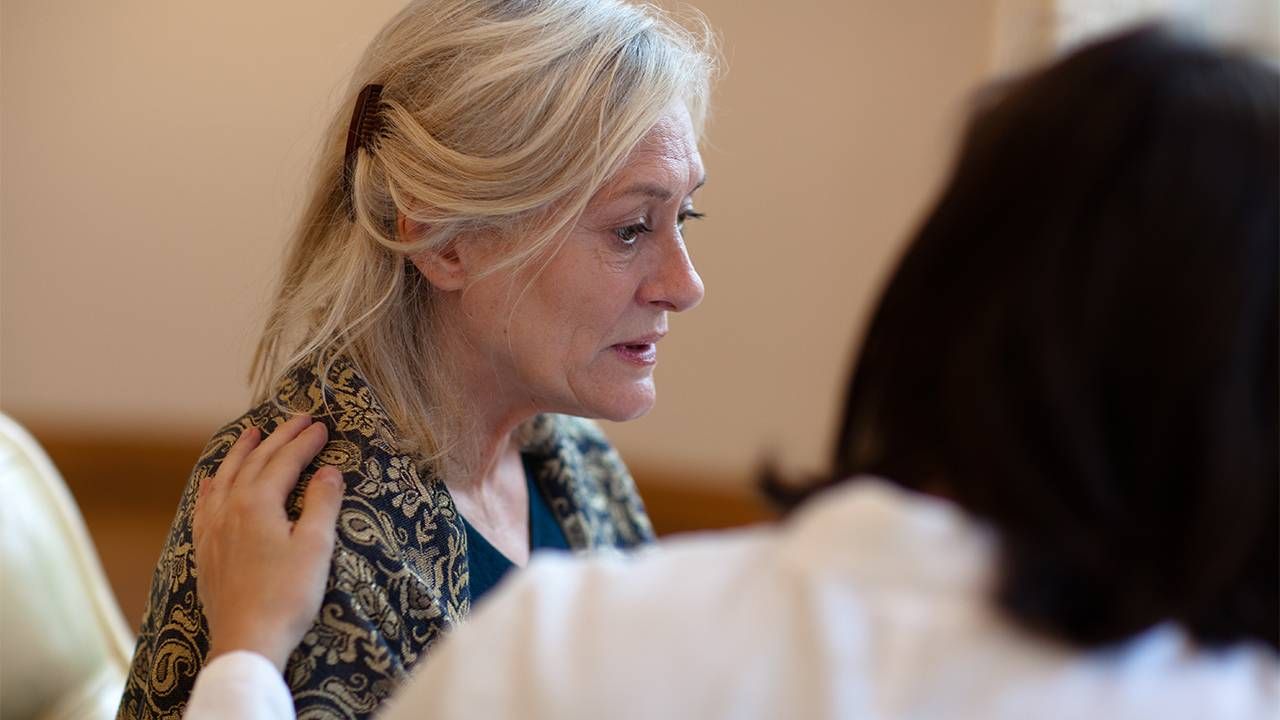Ageism in Dementia Care?
This writer has been thinking about early-onset dementia and whether long-term care facilities are ready for Gen X residents
"This is where we have our daily game of Mingle Bingo."
I'm virtual-touring a memory care facility in Phoenix, the city where I live.

"And around the corner here is where our residents like to just, you know, hang out," whispers Kathleen, the facility supervisor who's leading me on this virtual tour. She's whispering, I presume, because the three older care-home residents she's captured with her cell phone are all fast asleep, slumped or reclining in giant mauve Barcaloungers. Behind them, a subtitled rerun of "I Love Lucy" silently plays on an enormous wall-mounted TV.
Kathleen whips around another corner, saying: "Here's where you can go if you want a snack, any time of the day. We call it the Nook, and our residents just love it here."
From her perch at one of the Nook's café tables, an impressively tall woman waves a plastic spoon. "I'm 93!" she calls out to Kathleen's iPhone camera. I smile and wave back, unsure whether she can see me.
Early-Onset Dementia
I'm not looking to place a loved one or shopping for a new place to live. But I've been thinking a lot lately about these new studies I keep reading, the ones that say more people are being diagnosed with early-onset dementia.
I've been wondering not why there are more diagnoses, but rather if we're ready to care for a community of younger adults who are faced with a profound loss of memory and all that goes with it.
Kathleen's generous tour is telling me we aren't.
The facility appears to be clean and tidy, but every wall is pastel, its art of the framed-floral-print variety. The amenities are clearly designed for those born in the 1940s and before. Every resident Kathleen has captured in her video screen is in their 80s or so. This perfectly nice care facility looks like every other senior-care home I've ever visited.
"People in their fifties don't get dementia. That's just a disease of old people."
After Kathleen's done showing me around, I hang up and wait for a call from Dr. David S. Knopman, a clinical neurologist at the Mayo Clinic whom I've arranged to speak with. Knopman's name keeps popping up in articles about younger-onset dementia.
In one, he commented on a recent study proving that the prevalence of young-onset dementia is higher than experts have previously thought, with an estimated 175,000 Americans currently affected by early-onset dementia.
"Most dementia care is geared for older patients," Knopman had written about that study. "As a consequence, services are rarely available to address the needs of someone diagnosed with dementia in their 50s who has dependent children at home and a spouse who must continue working."
Or is someone who, you know, doesn't want to live in a facility with people his grandparents' age who are sleeping in front of the TV in a place where "fun" means "Bingo."
Creating LTC for Gen-X
While I wait for Knopman to call, I wonder how long it will be before the care facility industry will create communities where a 50-year-old can live comfortably and not feel like he's trapped at Grandma's house. Is there government funding for housing younger-onset patients?
Is there a movement to create more spaces that will cater, and appeal, to middle-aged people with dementia? Would my insurance cover such a place if it existed?
"It's harder for people under sixty-five to receive government assistance or other financial help. If you're fifty, you might still have children at home who are relying on your income to pay for college."
I'm guessing that the answer to these questions is "Not yet, anyhow." Which leaves me wondering if this is some form of reverse ageism.
My worried reverie is interrupted by Knopman's call. Pretty quickly, he assures me that my worst fears aren't far from wrong. The memory-care community isn't quite ready for more younger people with dementia.
"But it's not that they're discriminating against younger people with dementia," he assures me. "It's more that the care-facility system is geared toward older people, because that's who has routinely been diagnosed with dementia."
The reason for that, he says, is that primary physicians and neurologists have little experience recognizing early onset dementia and are apt to misdiagnose it as depression or anxiety. As a result, caregiving communities have yet to catch up with options and resources for younger people who need help.
"It's harder for people under sixty-five to receive government assistance or other financial help," Knopman tells me. "If you're fifty, you might still have children at home who are relying on your income to pay for college. When you can't work because you have dementia, and now you've got bills from a facility that your insurance doesn't pay, it can have a negative impact on the whole family."
Knopman worries that care facilities and their staff aren't set up for younger clients.
"But it's not just about how the places look or what entertainment they're offering," he says. "It's that they're trained to deal with clients who are eighty-years-old and frail. You get a sixty-year-old man who comes bounding in there, and what are they going to do if he gets upset and violent one day? Have they been trained for that kind of possibility?"
Few Options
I hang up and text Anissa Jung, a retired facilities-intake worker I met when I was caring for my mother. I ask Anissa if during her long career she found it harder to place young people with dementia in care homes.
"Yes," she texts back immediately. "When I could find a spot for a younger client, that is. The home could be hours away from the family doing the placement. Not optimal for anyone."
Jung tells me more: Because care homes are usually set up for sleepy older residents, younger, more vital people can become restless, spending more time in their rooms with little to do other than watch TV or nap.
"The stuff younger people entertain themselves with don't always work when you have dementia," she reminds me. "PlayStation, texting with friends, Facetiming with loved ones. Not easy to do when you've lost coordination, or you forget who the loved ones are."
Unnerved by all this scary news, I pull on my Keds and head out for my daily walk. I try to focus on trees and fresh wintry air and the sound of my shoes on gravel, but I keep coming back to something Kathleen said during our virtual tour of the memory-care facility where she worked.
When I asked about how, as more younger people are diagnosed with dementia, they planned to make room for them in her care-home community, Kathleen had laughed.
"Oh, hon," she said. "People in their fifties don't get dementia. That's just a disease of old people."
Editor’s note: This story is part of The Future of Elder Care, a Next Avenue initiative with support from The John A. Hartford Foundation.


